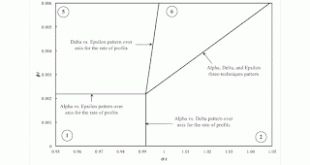[embedded content]Mirowski On Markomata In the title of this post, I introduce a new technical term. Consider a Leontief input-output matrix characterizing the technique in use, in physical terms. Suppose n industries are producing n commodities. If an alternative process is available in one industry, then a problem of the choice between two techniques arises. If two processes are available in each industry, the choice is among 2n techniques. If three processes are available in each...
Read More »Elsewhere
The field of economics shouldn't exist, a video on Tik-Tok. A revived Christian Democracy as a Catholic alternative to neoliberalism. A article by Anothony Annett for Commonweal. The worldy turn, by Tom Bergen, for Aeon.
Read More »Causes Of Inflation
Social norms exist about what wages can be expected from various types of jobs. And norms also exist for what the rate of profits or markups will be. Inflation arises when these norms conflict and institutions exist to fight about these norms. There is no single rate of profits or a single wage for all jobs. In some jobs, you can expect to have a standard work week, weekends off, benefits, some asurance that your job will exist next week, and so. And in other jobs you cannot expect such....
Read More »Variation Of Prices Of Production With Time In An Example Of Intensive Rent
Figure 1: Variation of the Wage Frontier with Technical Progress I continue to explore perturbations of an example from Antonio D'Agata. I have found a new type of fluke switch point, in models of intensive rent. Here I explore structural dynamics along a path in which technical change overwhelms the scarcity of land. In this post, I repeat the data on technology, with a specific parameterization. Table 1 presents the available technology. Iron and steel are produced in processes with...
Read More »The Production of Commodities by Means of Commodity and Money
Money is a medium of exchange (or means of purchase), a unit of account, and a store of wealth. I think Sraffa (1960) implicitly assumes an economy in which money is used. How would one explicitly and formally introduce money into Sraffa's scheme? I think one would want a theory of endogenous money, maybe as in a circuitist theory. How should the references below be extended? Which should I make an effort to read? I am aware that Sinha (2021) has a couple of other chapters about money and...
Read More »A Pattern For Non-Uniqueness
Figure 1: The Wage Frontier And Rent I continue to explore perturbations of an example from Antonio D'Agata. I have found a new type of fluke switch point, in models of intensive rent. In this post, I repeat the data on technology, with a specific parameterization. Table 1 presents the available technology. Corn is grown on homogeneous land, and three processes are available for producing corn. One hundred acres of land are available, leading to the possibility of two processes being...
Read More »A Mistake In Kurz And Salvdori (1995)?
On page 299 of Kurz and Salvadori (1995), they write: System (10.10) is identical with system (8.13). The above statement is correct only if the steady state rate of growth is zero. The analysis presented around system 8.13 applies to any rate of growth lower than the rate of profits. Chapter 8 is about joint production in general. Equations 8.13a through 8.13e specify a long-period position for joint production. Equation 8.13c specifies quantity relations and is: zT ( B - (1 + g)...
Read More »Geoffrey Harcourt (1931-1921)
This overview of Geoff Harcourt's work is insufficient. He was interested in economics as a means to a better world. Consequently, he offered political advice, sometimes in the form of 'package deals', in the context of Australian politics, which I know nothing about. Also, I do not know Austrian rules football, rugby, or cricket. Apparently, he was very good at mentorship and at introducing young scholars to the professional community. Capital theory is a very contentious topic, but...
Read More »Three Patterns Across The Axis For The Rate Of Profits In A Model Of Intensive Rent
Figure 1: Three Patterns Across the r Axis and One Three-Technique Pattern This post begins a perturbation analysis of an example of intensive rent from D'Agata. I have previously claimed that certain structures in parameter space are universal in some sense. Table 1 presents the available technology. Corn is grown on homogeneous land, and three processes are available for producing corn. One hundred acres of land are available, leading to the possibility of two processes being operated...
Read More »Elsewhere
Many articles from the Thames Papers in Political Economy to 1989 are now available open access. The articles in Political Economy: Studies in the Surplus Approach, from 1985 to 1990, are also available open access. There is now a Post Keynesian Discord server, whatever that is. Here is a Post Keynesian blog, on this newish substack thingy.
Read More » Robert Vienneau: Thoughts Economics
Robert Vienneau: Thoughts Economics

